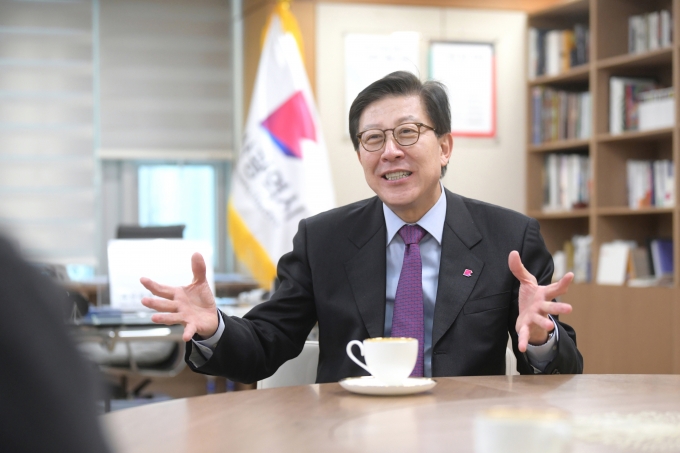Last Fall, they targeted the Chosun Ilbo, Dong-a Ilbo and JoongAng Ilbo.
…Is the Financial Times next?
Late last year, the ruling party, angry with dissent from the press, passed the so-called Media Reform Bill, which strictly limits the market share of key dissenting newspapers Chosun Ilbo, Dong-a Ilbo and JoongAng Ilbo. Can we expect any more dissent from these papers now? Will the newsstands just "run out" of copies every day at 6:15 A.M.? It's no wonder Reporters Without Borders criticized this legislation.
Last week, government regulators found another newspaper with the audacity to disagree with them, and they are on the warpath once again. They accused the Financial Times in London of "intentional ill-intended reporting," "Anti-Korea slurs," and are demanding a retraction or opportunity to rebut.
Will the Korean government clamp down on the Financial Times' illegal market share, too? Will the Financial Times apologize to the regulators? Will Condoleeza Rice apologize to Kim, Jong-Il? Stay tuned, because this week, the Land of the Morning Calm is anything but.
So how did this latest newspaper anger the regulators so much? It was the result of another piece of legislation passed by the Assembly during Christmas vacation, the amendments to the Securities Exchange Act, relating to stock ownership disclosure rules. The dispute relates to unequal treatment, so let's try to be as precise as we possibly can on that subject:
In the U.S., after buying 5% of a company's stock, you can file Form 13-D with the SEC, and immediately after that buy another 44%, call for an EGM (Emergency General Meeting), and vote your 49% to remove the Board of Directors and management. Can you do this in Korea? No, of course not. You have to wait five days while management ramps up the share price, conveniently making the deal too expensive for you. In the U.S., waiting is only required for investors who change their filing status, and not to those who disclose intentions from the outset.
The regulators said "Korea will continue to keep its equal treatment principle to foreign capital." In the U.S., pension funds have always filed Form 13-D or 13-G with the SEC if they buy more than 5% of a company's stock. Have Korean pension funds filed any of these forms yet, or been subject to the stringent deadline imposed on other investors? No, they have not at this point. Along with Korean ITCs, they don't even have to pay the costly transaction taxes charged to foreign institutions exactly like them.
The regulators assert the new law "is not related to certain acts by foreigners such as Sovereign." However long the regulators researched the amendments, it would appear there was never any disclosure the study was underway, and this is why a connection is being made. Regardless of the impetus of the amendments, what is happening and is surprising is the ruling party siding with entrenched business fat-cats. Wasn't their promise to fight for all the little guys out there, like independent shareholders?
That's not the end of it. Last week, a forum was launched, led by Uri Party lawmakers, to investigate past rescue sales of KorAm Bank, Korea Exchange Bank, and Korea First Bank to foreign financial institutions. It may be that many are too young to remember that foreign banks came to the rescue when Korea's financial sector suffered a thermonuclear meltdown seven years ago. One hopes a Mugabe-style expropriations are not in the planning stages as we speak.
Will the 5% rule affect Korea's El Dorado dream, the fabled Northeast Asian Hub? On this, I cannot make any firm predictions at this time. However, judging from the recently departed Minister of Construction's business activities at the Incheon Free Economic Zone -- as exposed by Korea's Commission on Corruption -- the Hub is looking ever more wobbly with each passing day. Even the top guy of the European Union says it's a bad idea.
Henry M. Seggerman
- VIEW 5,736
- 2005.04.09 10:20
헨리 세거만의 기고 원문
|
<저작권자 © ‘돈이 보이는 리얼타임 뉴스’ 머니투데이, 무단전재 및 재배포 금지>
|
















![돌연 사라진 70대 재력가…내연녀 집 시멘트 부쉈더니 시신으로[뉴스속오늘]](https://thumb.mt.co.kr/11/2024/04/2024042417433499310_1.jpg/dims/resize/100x/optimize/)






![[단독]어도어 경영진, 글로벌 국부펀드에 매각 검토...애널 실명도 등장](https://thumb.mt.co.kr/11/2024/04/2024042308451477838_1.jpg/dims/resize/100x/optimize/)




























!["꼭 가야 해" 사람 가득 실은 배 30분 만에 침몰…292명 대참사[뉴스속오늘]](https://thumb.mt.co.kr/10/2023/10/2023100611053583558_1.jpg/dims/resize/100x/optimize)


















![미국 대선, 6개주만 보면 답 나온다 [PADO 편집장의 '미국 대 미국']](https://i4.ytimg.com/vi/7kc1ddGnWtE/hqdefault.jpg)


















